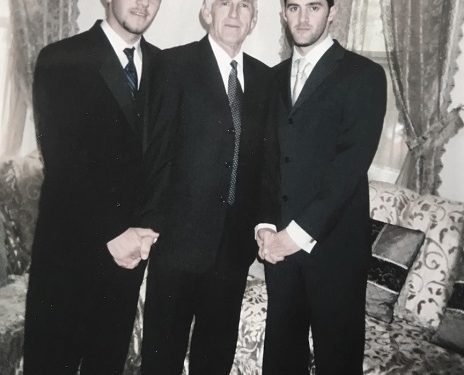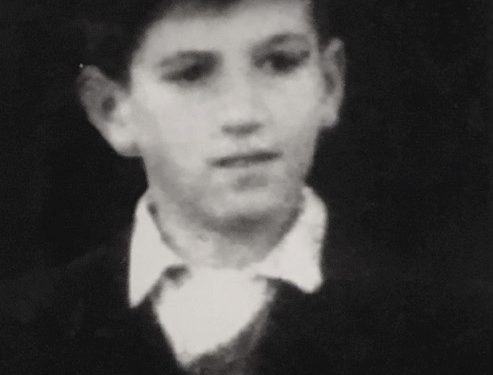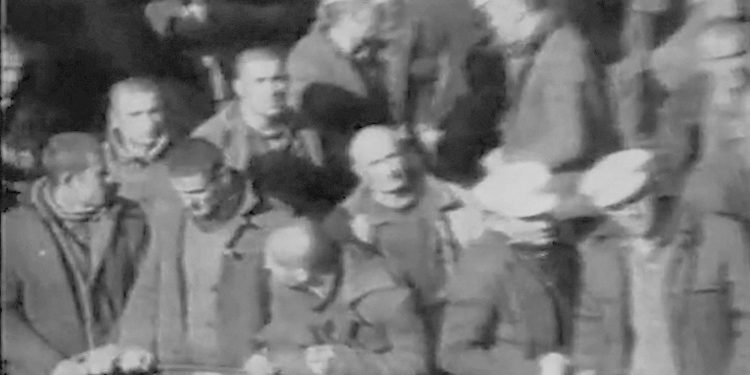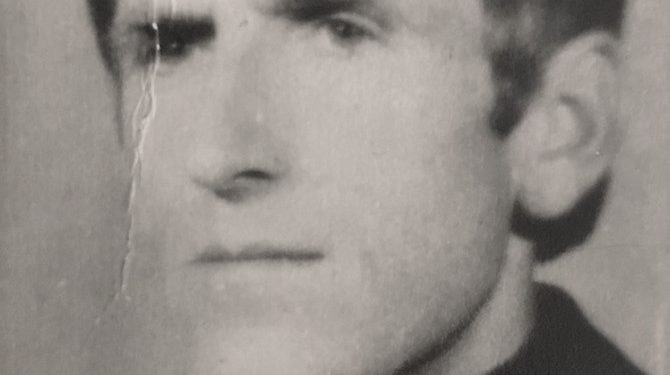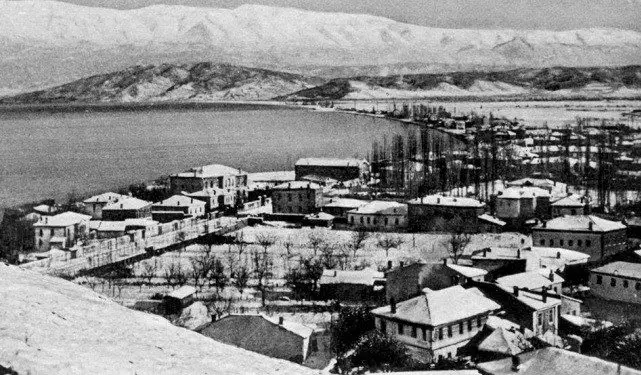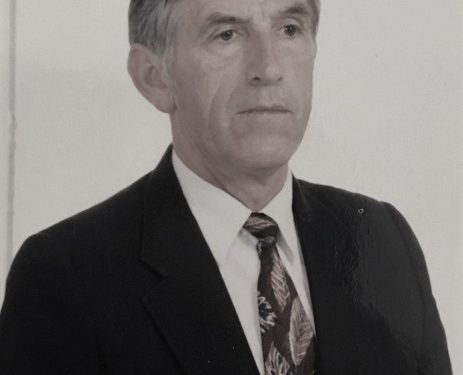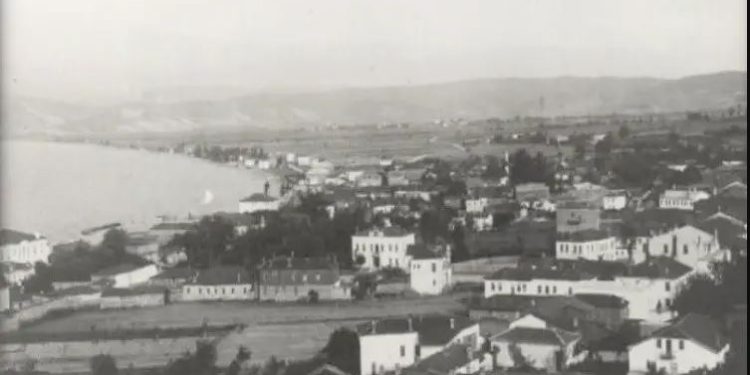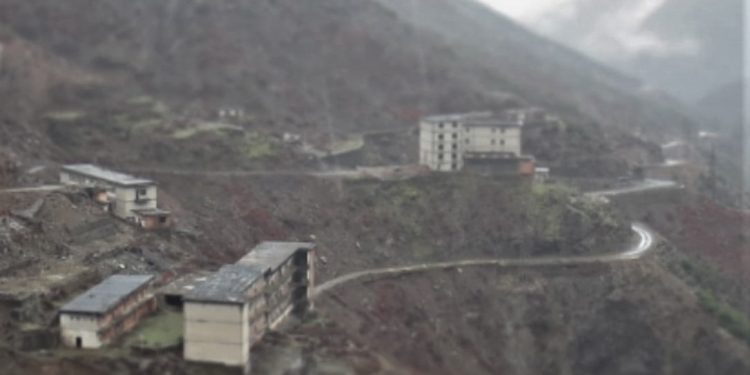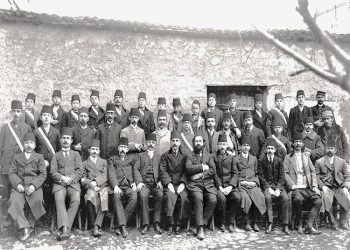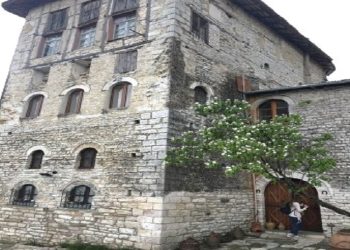By Sokol Paja
Memorie.al / Muharrem Xhydollari (Hudenishti) originally from Pogradec, formerly persecuted, persecuted and imprisoned by the communists for 9 years in Spaçi prison, with 5 family members shot and sentenced to 5 years of exile, after his release from prison, tells exclusively for the newspaper “Dielli”, Organ of the Pan-Albanian Federation of America “VATRA”, New York, personal and family persecution, chilling history of Spači prison, acquaintance with the clergy and intellectual elite of the nation, such as Monsignor Zef Simoni , Monsignor Ernest Troshani, Dom Mark Hasi, Father Zef Pllumi, Visar Zhiti, Eugjen Merlika, Dine Dine, Lek Mirakaj and others. “Dielli” journalist Sokol Paja talked with Muharrem Xhydollari (Hudenishti).
The testimony of Muharrem Xhydollari: “How were we persecuted by the communists”?
They stopped next to me. “You are Muharrem Xhydollari”? Yes, I answered. “You will come with us,” said one of them, “we are the Internal Branch.” I didn’t speak, I sat in the back seat of the “Jeep”, between two civilians, and without speaking at all, and he stopped at the entrance to my village. The one sitting in the first seat of the car opened the window and asked a person who resembled those of my companions. “Hey, they started,” he said. Got the answer; “yes”. (It was about checking my apartment).
Then the two who were next to me, took out the handcuffs and said to me in a very soft voice: -“You are under arrest”, and tied my hands in front of me. They untied me when they put me in the isolation room. They took me after two weeks for questioning. This delay was explained by the fact that after the arrest, they collected the denunciations. The investigator had me read the arrest warrant. I read it; it was the order of the Attorney General. “That’s it for today,” said the investigator. He introduced himself: “I am Ferit Sula,” he said, and handed me over to the prison manager.
Investigation in two stages
I would divide the investigation into two phases. The name of my executioner that I told you a little above could not be just a man. But luckily for me, he didn’t stay long in Pogradec, and went to Tirana (they say that today he is a resident in Germany, as a political asylum seeker). He was replaced by Hektor Shehu (from Tepelena), his profession was a teacher. He, with few specializations, had benefited from the dirtiest profession in the world, that of executioner.
But he didn’t show himself like that, he didn’t prefer to mistreat me, except in the handcuffs and the dungeon. -“You cannot be innocent,” he told me, “because your family circumstances do not favor you at all.” You are who you are, that’s why you are guilty.” “You,” he continued, “are caught by the crime prevention law in force, which is explained by the article on agitation and propaganda.” He very briefly closed the file and took it to trial.
Isolation in the dungeons of the investigation
In the solitary confinement room, I thought back to my history and the reasons why I was predestined to be punished. I was born and raised in a family that has produced people with political influence, in the interest of the fate of the homeland since the Renaissance, Independence, World War I, the formation of the Albanian State and the Nazi-Fascist War. The anti-Slavic-Communist hatred that my family had caused it to suffer the highest degree of persecution.
As such, I was predestined to be condemned. It was a period when individuals, who were targeted by the Security organs, were called to mass gatherings in agricultural cooperatives, state enterprises, farms, villages, etc., and were subjected to discriminatory political criticism or exposure. This is for terror among the people.
But the experimental trials also had this purpose. I would be tried in my village. The courtroom was left with very few villagers. They took the high school graduates and brought them into the hall. As soon as they saw me handcuffed and escorted by the police, they ran away and did not stay in my judgment. Only two or three authorized persons stood up and spoke against me, saying only that I was the son of a family that did not agree with the communist policy and as such I should be punished.
Some cadres of the village spoke, perhaps to protect themselves, that they did not know anything that I had done agitation and propaganda. That I had spoken in favor of Beqir Balluku and Petri Dumes, with whom we had shared jobs since 1944. Why I had spoken that; the field of Kosovo was large and very fertile! – “This dog son of a dog,” said the witness, “why didn’t he say about the field of Myzeqe and that of Korca, which are the barns of Albania, but he talked about the Field of Kosovo, which are revisionists”?!
This was the logic that called me guilty and sentenced me to 10 years of imprisonment. And some other fragments that met the maximum penalty, for agitation and propaganda. But there is also something that surprises you, when the trial ended, the investigator came to the isolation room and said to me: “Did you know how much you were sentenced?” – Yes, I told him, 10 years.
– You would be punished less, he said, but the village burdened you more. -“But the villagers didn’t speak badly about me”, I told him. – Yes, precisely because they did not speak badly, without taking the maximum, because if they had spoken badly, there would have been a lower punishment. This meant that the more the people loved you, the more the party-state condemned you…!
With Dom Mark Hasi and Petro Marko’s son
The day I went to “Kaush” – (Prison 313 in Tirana), Jamarbër Marko (Madu), the son of the writer Petro Marko, also came that day, convicted. We spent a not too long time together with him and formed a company. “Kaushi” was full of prisoners. There were also those who came from Camp-Burgu i Ballshit. Dom Mark Hasi, great orator of the Catholic churches in Albania and he was like that.
His resounding voice rang out, like early church bells; he drew you and made you his own. He gave us advice and short lectures, full of morals. Because of his age, Madua and I used to compete as to who could serve him more. He went to continue serving his sentence in Ballsh. I gave him a pair of woolen socks to give to my father there, who continued to suffer for 23 years without interruption.
The prison of Spaçi, a ghastly ghost…!
Forced labor was also applied to the place where the punishment will continue. It was the mine of Camp-Burgu of Spaçi, Mirdita. As soon as I got out of the car-jail, I saw a ghostly place, that even Hollywood fantasists could not improvise a similar ghastly scene for their movies. A sample place, where it was predicted that I wouldn’t get out of there alive! This is because the names of newly arrested political persons were marked with a red line in the registers of civil status.
Communist demagoguery called Spaçin “rehabilitation camp”. The means of rehabilitation were: hunger, exhausting work, dungeons and isolation, through which the convicts had to reach and appreciate the dictatorship. It goes without saying: not only do I beat you, but I also don’t let you cry.
The camp was nestled between the gorges of Spaçi, on the eastern side of a narrow slope, at the end of which meandered a stream, with water like acid with an ocher-green color that would fit for hell.
It was unbelievable that 1,200 people lived in those buildings. In every 8 hours that were called shifts, the line of convicts was inefficient. Where did all those disfigured people come from?! They came out of this hermetic cage of wires; they took the road in a very broken mountain, to enter the black galleries of pyrite and copper. Descriptions of this place of suffering have made many other pens, and I don’t want to go on.
The communists carried out terror, whoever killed was rewarded with a permit
My mind cannot be separated from three or four episodes that are very special for me, because I assisted myself. They remain unforgettable. The execution by firearm, of Miho Shëngjergji, from the roots of the siege, was unbelievable. Miho was old and could not cross the wires with many fences. They killed him in the camp, inside the siege. But such concern was removed by the convicts of Spaci a few weeks ago.
When the siege guards shot the convict Alem Luzi from Kanina in Vlora. Alemi, the investigation had taken him to such a stage that he could not resist staying in this cage. Rexhep Goci from Tropoja, had to serve another 11 days in prison, because of this the amnesty of 1982 did not catch him. He was assigned to work in the second zone. The guards of the siege shot him with automatic volleys, not in the restricted area.
The guard who shot was rewarded by the command with permission to go to the family, but we later learned from booksellers that after 1990, he led a section of the Democratic Party. In the first week of June, we had to work the third shift, Frederik Tarrell’s group, with Luc Vuka and Arben Dila, worked on a front where their lives were endangered, from time to time. And so it happened. The mountain collapsed, Frederik escaped with minor injuries, Arben Dila ended up in the hospital, from where he recovered.
While Luca, our beloved and pitiful, remained there under the mountain, where his remains, one day, will emerge as the sprout of a memorial, which will join the memorials of our comrades, whose lives were taken by the dictatorship communist. In the extermination prison camp Spaç, Mirdita, Luc Vuka, this boy from the Great Highlands, fought until the last day.
With his god-forgiven weapon (sarcasm) with which he killed, butchered, robbed and humiliated the dictators of the most hated system in the world, the communist and Enverist ones, every day. For this, Luca ranks the same, with those who produced literature, inside this hell and outside it.
Re-arrests and re-convictions of prisoners
The re-arrests and re-convictions that fortunate individuals would not be given what was called freedom remain unforgotten. That according to the greens, (the color of the State Security uniforms), they constituted social danger. Without describing details in my memoirs, I return to my arrival in this extermination camp.
When I came down from the auto-jail, apart from what I described above, I saw a great density of that population, which had been deprived of its freedom. Disfigured people, their non-vitamin faces, gave the impression that they were extraterrestrials, like paintings of dead souls by Nikolay Gogol.
The days passed in anxiety, to acclimatize in that place and with those people with whom I had united my fate, my life. People of different ages, with different cultures, but also from different walks of life, that later I saw and learned that some of them lived with hope and the rest with faith.
In this camp, days passed and life was wasted, the memory of this life that was wasted would fight against the oblivion that the system and power needed. In order to perpetuate this memory, intelligent, brave and trustworthy warriors were needed, which in this population density, were not missing.
The sensibilities of those intellectuals, every event that happened with great secrecy, they put in letters, writing in different genres, in poetry, prose and others.
Personalities of the Albanian world in Spaçi prison
And in order not to remain without authorship, they found (lulja-lulen), consulted and exchanged each other’s writings, thus forming literary circles that would experience the dark days and years in this dark country. So in a group, the passionate guys were; Zyhdi Morava, Ylber Merdani, Ferit Tahe Shefqet Dobra, Ali Laze, Max Rakipi, Hasan Bajo, Eqerem Muja, Gëzim Medolli, Pëllumb Lame, Xhemal Mustafaraj, Vilson Zeka, Fatmir Lame.
But also at the level of profession, not of passion, there were Visar Zhiti, Father Zef Pllumi, Eugjen Merlika, Dine Dine, Lek Miraka, who not only did not forget what they wrote in Spaç-Burg, but their writings, the project of which they were from that time of isolation, remained at a high level of Albanian national dissidence.
The writings of the above authors, written in Camp-Prison of Spaçit, are a combination of literature and real events. This literature, written in the hermetic cage with thorns, should be returned to visual vision, through film strips, where the main roles are performed by artists, whose characters correspond to the writings of the authors who, in their books, have thrown away the truths of that bitter life, which has not yet passed.
For me, apart from the sentence of 10 years of imprisonment, the sufferings of my mother, brothers and sister, who were multiplied by a terrible class war, faced not only by the State Security bodies, but also with the population, caused me special difficulties of the village, district and beyond.
They were charged with a long internment for years, and were moved several times from the place of internment, until they were buried in a mountain between Berat, Përmet and Tepelena. This was a village that, as they say, ate stone chickens. They lived amid strict security measures. They never allowed me to be brought to prison for a meeting!
From Father Zef Pëllumi, to Dom Zef Simoni and Cardinal Troshani
The main aim of the dictatorship was to fight the Catholic clergy and the institutions where they served, until their complete disappearance. The years 1975-1985 were a little late, but some of these personalities served their sentences in Spaçi prison.
Although they belonged to the third age, they continued to remain within the human soul. Reverends: Ernest Troshani, Kolec Andoni, Zef Kol Hardhia (Simoni), Zef Ashta, Father Zef Pllumi, Dom Ndoc Sahatçija. They stood very close to their fellow sufferers, were moral and gave morals.
They did not mix with conversations that commented on politics. Except for Zef Pllumi, who was fresher in mind than his colleagues? He contacted fellow sufferers, studied them and recorded in his memory the material he would need for the brilliant writings he would later create.
Even when Father Zef Pllumi was released from prison, he did not lose contact with his fellow sufferers. He, with the humanity he had, connected with several humanitarian associations operating around the Vatican and guaranteed his fellow prisoners a modest financial sum.
This assistance continued for several months in a row and was at the most appropriate time, for those just released from communist prisons. The past remains a reminder of crimes that have disappeared, national values. It has contributed a lot to the development of our country.
I can say about the hell that we went through, it doesn’t leave our mind and dreams appear to us about that time. But today it is worth noting that only the “right” maintained the same line even in the post-dictatorship period.
Communism must read itself, because the Albanian man, after communism, inherited a deformed morality, that of the mercenary, which he continues to have even after the political changes, for these 30 years. But we do not belong to those who hope, but to those who believe. Therefore, civil society remains paralyzed. For the best, we believe, believe, and believe.
The patriotic Hudenishti family
My grandfather Muharrem Hudenishti was an officer of the Albanian Kingdom, a freedom fighter, associated with the revivalists since 1905. He was executed on November 23, 1939, by Italian fascism. My father Besim Hudenishti, senior economist graduated in Austria in 1934.
Political prisoner by the Slavo-Communists. He spent 29 and half years in prison, three months after he was released, he died in exile in 1982. My father Besimi was sentenced by the fascists in 1941 to 16 years in prison, part of the sentence he served in Cambo-Baso in Italy.
My uncle, Nuri Hudenishti, had finished the military academy in Italy in 1937. He was interned in Ulcinj by fascism, one of the 37 interned, for two and a half years. Formed the Legality political group. As the leader of this group for the southeast of Albania, he collaborated with Abaz Kupin and many northern birders. Nuri’s activity against Nazi-fascism is confirmed by the English missionaries who worked in Albania, Bill Maclean and David Smajli, in their books. He was shot by the communists on July 10, 1946. Memorie.al




